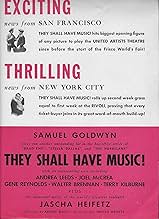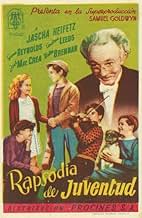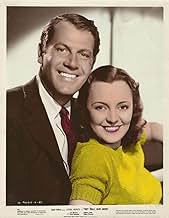A boy runs away from home and ends up at a music school for poor children. When the school suffers hard times, he enlists the aid of violinist Heifetz to save the day.A boy runs away from home and ends up at a music school for poor children. When the school suffers hard times, he enlists the aid of violinist Heifetz to save the day.A boy runs away from home and ends up at a music school for poor children. When the school suffers hard times, he enlists the aid of violinist Heifetz to save the day.
- Nominated for 1 Oscar
- 1 nomination total
Photos
Gale Sherwood
- Betty
- (as Jacqueline Nash)
Alexander Schoenberg
- Menken
- (as Alexander Schonberg)
- Director
- Writers
- All cast & crew
- Production, box office & more at IMDbPro
Storyline
Did you know
- TriviaIn the movie, the newspaper account lists Jascha Heifetz's stolen violin as a Stradivarius. Heifetz used a Guarnarius in the picture and favored that violin in real life, but the producers felt that the name of Stradivarius would be more recognizable.
- GoofsThe movie was spliced together from many takes, so there are numerous continuity holes, especially during the performaces.
- SoundtracksAndante cantabile
from "String Quartet No.1 in D, Op.11" (1871) (uncredited)
Written by Pyotr Ilyich Tchaikovsky
In the score during the opening credits
Reprised a bit by Gene Reynolds (violin)
Featured review
THEY SHALL HAVE MUSIC (United Artists, 1939), directed by Archie Mayo, became producer Samuel Goldwyn's tribute to classical music through the eyes and talent of young children. Headlined by Jascha Heifetz (1901-1987), a celebrated violin virtuoso, with name above the title, ahead of renowned screen veterans Joel McCrea, Andrea Leeds and Walter Brennan, this production might have served as a biographical subject on Heifetz with him enacting his own story up to his legendary status. Instead, it's something completely different, dedicated "To the many schools throughout the world --- devoted to the development and encouragement of great talent among the children of the poor." The main character of the story isn't any of the actors mentioned, but the fourth billed Gene Reynolds, who actually carries the 102 minute film from start to finish.
As Frankie Miller, he's a tough New York City slum kid living with his kindhearted mother, Jane (Marjorie Main) and strict stepfather, Ed (Arthur Hohl). He's also leader and treasurer of a group of boys, Limey (Terry Kilburn), Rocks (Walter Tetley) and Fever (Chuck Stubbs), spending much time on the streets getting in trouble with authorities and neighbors. One evening, Frankie and Limey find two unused tickets to a Jascha Heifetz concert. Unable to pawn off the tickets, they attend the recital instead. With Limey bored to tears, Frankie takes much interest in Heifetz. After returning home, he acquires his late father's fiddle to develop his musical talent imitating Heifetz. A heated argument with his stepfather follows, whom he nearly attacks, causing Frankie to run away and avoid being arrested and taken to reform school. Very much on his own, carrying a violin case for food and supplies, the boy earns money shining shoes by day and sleeps in an abandoned car by night. Things start to look better for Frankie after befriending a stray dog he names "Sucker," later leading him into a Third Street music school for poor children. Finding "Frankie Smith" to have an ear for music, and no place to stay, Professor Lawson (Walter Brennan, in fine characterization), the school's founder, offers the teenager room and board and acceptance as one of his pupils. Because the school is six months behind on their rent, and unable to survive on donations alone, Mr. Flower (Porter Hall), whose associate, Peter McCarthy (Joel McCrea), who never bothered to collect due to his love for Lawson's daughter, Ann (Andrea Leeds), threatens to close down the school. Through Frankie's good intentions, he makes efforts to save the school by trying to speak to Mr. Heifetz at his home. Situations become more complex when Heifetz's $70,000 Stradivarius is reported missing and now in Frankie's possession.
In a sense of being an original story, the screenplay tends to borrow portions from Goldwyn's own DEAD END (1937), using tough kids from New York's poor district as main attractions, and Universal's ONE HUNDRED MEN AND A GIRL (1937), with talented teenage singer (Deanna Durbin) helping her father's unemployed musicians by getting the sponsorship of musical conductor Leopold Stokowski. Whether intentional or not, THEY SHALL HAVE MUSIC does get by on its own merits, especially with interludes to fine classical pieces consisting of: Peter Tchiakowsky's "Andante Cantabile" from "String Quartet No.1 in D, Opus 11"; "Introduction and Rondo Capriccioso, Opus 28"; Frederic Chopin's "Nocturne in B Flat Minor, Opus.9, No.1"; "Caro Nome" from Giuseppe Verdi's "Rigoletto" (beautifully sung by Jacqueline Nash); Wolfgang Mozart's "Eine Kleine Nachtmusik" "Hora Staccato" and "Estrellita" "The Barber of Seville," "The Minute Waltz in D Flat" (piano played Mary Ruth); "Symphony No.4 in A ('Italian'), Opus. 90," "Casta Diva," and "Violin Concerto in E Minor." Others participants to these compositions aside from Heifetz include the California Junior Symphony Orchestra.
In spite of its somewhat contrived screenplay held together through a series of circumstances, THEY SHALL HAVE MUSIC is as entertaining as it is underrated. With McCrea and Leeds having little to do, with Heifetz having even less by way of acting, Gene Reynolds, a fine young actor with sincerity and conviction, on loan out assignment from MGM, never developed into a top teen idol as did box office attraction Mickey Rooney. Nearly forgotten as an actor, Reynolds did become better known in later years as director and producer of TV shows, especially the long running, MASH (CBS, 1972-1983). Tommy Kelly, lead boy actor in 1938's "Adventures of Tom Sawyer," and "Peck's Bad Boy at the Circus," is reduced to minor role as Willie, the kid whom Frankie hounds for membership dues for the club.
With this being an overlooked Goldwyn production, THEY SHALL HAVE MUSIC did get plenty of exposure over the years, through its 1986 video cassette distribution; cable television broadcasts on American Movie Classics (1992-94) and Turner Classic Movies (where it premiered March 30, 2007). Anyone seeking for relatively unknown movie, this is one to consider, along with another similar themed production of MUSIC OF THE HEART (Miramax, 1999) featuring Meryl Streep. (***1/2)
As Frankie Miller, he's a tough New York City slum kid living with his kindhearted mother, Jane (Marjorie Main) and strict stepfather, Ed (Arthur Hohl). He's also leader and treasurer of a group of boys, Limey (Terry Kilburn), Rocks (Walter Tetley) and Fever (Chuck Stubbs), spending much time on the streets getting in trouble with authorities and neighbors. One evening, Frankie and Limey find two unused tickets to a Jascha Heifetz concert. Unable to pawn off the tickets, they attend the recital instead. With Limey bored to tears, Frankie takes much interest in Heifetz. After returning home, he acquires his late father's fiddle to develop his musical talent imitating Heifetz. A heated argument with his stepfather follows, whom he nearly attacks, causing Frankie to run away and avoid being arrested and taken to reform school. Very much on his own, carrying a violin case for food and supplies, the boy earns money shining shoes by day and sleeps in an abandoned car by night. Things start to look better for Frankie after befriending a stray dog he names "Sucker," later leading him into a Third Street music school for poor children. Finding "Frankie Smith" to have an ear for music, and no place to stay, Professor Lawson (Walter Brennan, in fine characterization), the school's founder, offers the teenager room and board and acceptance as one of his pupils. Because the school is six months behind on their rent, and unable to survive on donations alone, Mr. Flower (Porter Hall), whose associate, Peter McCarthy (Joel McCrea), who never bothered to collect due to his love for Lawson's daughter, Ann (Andrea Leeds), threatens to close down the school. Through Frankie's good intentions, he makes efforts to save the school by trying to speak to Mr. Heifetz at his home. Situations become more complex when Heifetz's $70,000 Stradivarius is reported missing and now in Frankie's possession.
In a sense of being an original story, the screenplay tends to borrow portions from Goldwyn's own DEAD END (1937), using tough kids from New York's poor district as main attractions, and Universal's ONE HUNDRED MEN AND A GIRL (1937), with talented teenage singer (Deanna Durbin) helping her father's unemployed musicians by getting the sponsorship of musical conductor Leopold Stokowski. Whether intentional or not, THEY SHALL HAVE MUSIC does get by on its own merits, especially with interludes to fine classical pieces consisting of: Peter Tchiakowsky's "Andante Cantabile" from "String Quartet No.1 in D, Opus 11"; "Introduction and Rondo Capriccioso, Opus 28"; Frederic Chopin's "Nocturne in B Flat Minor, Opus.9, No.1"; "Caro Nome" from Giuseppe Verdi's "Rigoletto" (beautifully sung by Jacqueline Nash); Wolfgang Mozart's "Eine Kleine Nachtmusik" "Hora Staccato" and "Estrellita" "The Barber of Seville," "The Minute Waltz in D Flat" (piano played Mary Ruth); "Symphony No.4 in A ('Italian'), Opus. 90," "Casta Diva," and "Violin Concerto in E Minor." Others participants to these compositions aside from Heifetz include the California Junior Symphony Orchestra.
In spite of its somewhat contrived screenplay held together through a series of circumstances, THEY SHALL HAVE MUSIC is as entertaining as it is underrated. With McCrea and Leeds having little to do, with Heifetz having even less by way of acting, Gene Reynolds, a fine young actor with sincerity and conviction, on loan out assignment from MGM, never developed into a top teen idol as did box office attraction Mickey Rooney. Nearly forgotten as an actor, Reynolds did become better known in later years as director and producer of TV shows, especially the long running, MASH (CBS, 1972-1983). Tommy Kelly, lead boy actor in 1938's "Adventures of Tom Sawyer," and "Peck's Bad Boy at the Circus," is reduced to minor role as Willie, the kid whom Frankie hounds for membership dues for the club.
With this being an overlooked Goldwyn production, THEY SHALL HAVE MUSIC did get plenty of exposure over the years, through its 1986 video cassette distribution; cable television broadcasts on American Movie Classics (1992-94) and Turner Classic Movies (where it premiered March 30, 2007). Anyone seeking for relatively unknown movie, this is one to consider, along with another similar themed production of MUSIC OF THE HEART (Miramax, 1999) featuring Meryl Streep. (***1/2)
- How long is They Shall Have Music?Powered by Alexa
Details
- Release date
- Country of origin
- Language
- Also known as
- Angels Making Music
- Filming locations
- Production company
- See more company credits at IMDbPro
- Runtime1 hour 42 minutes
- Color
- Aspect ratio
- 1.37 : 1
Contribute to this page
Suggest an edit or add missing content

Top Gap
By what name was They Shall Have Music (1939) officially released in Canada in English?
Answer




















